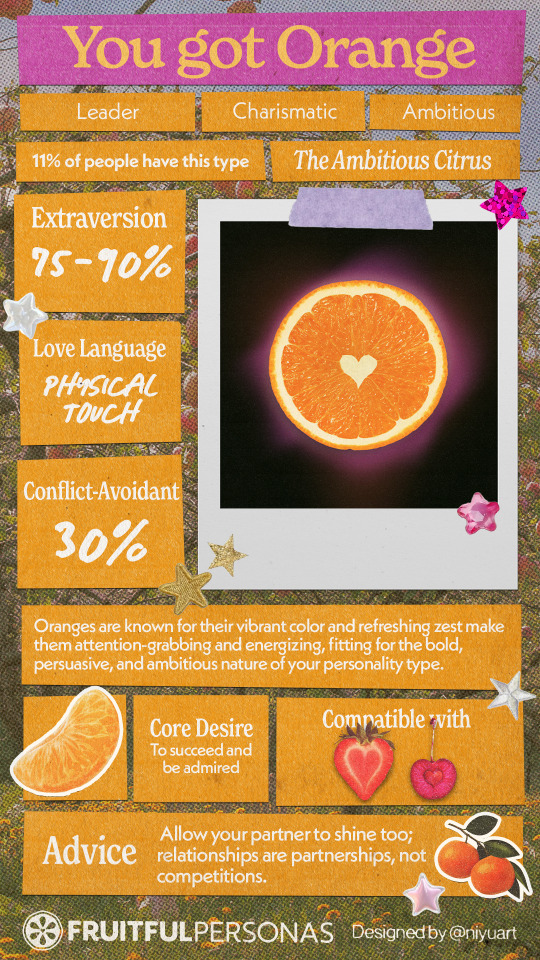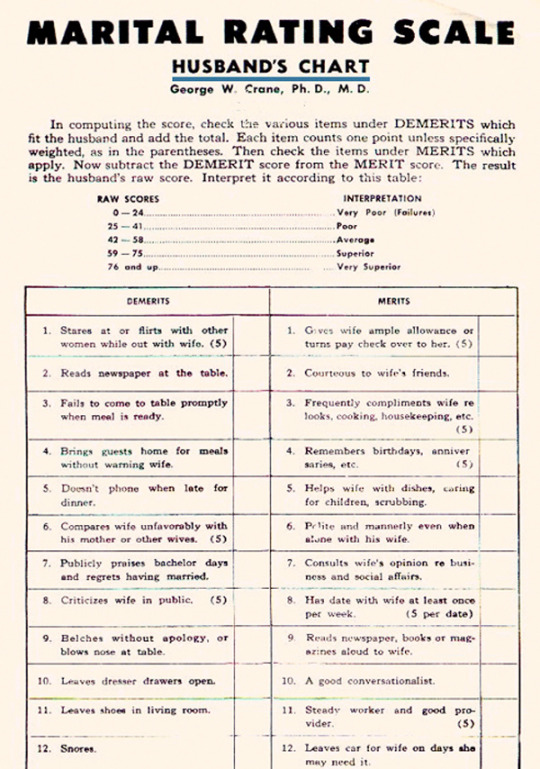#Quizzes and tests
Explore tagged Tumblr posts
Text
Fruitful Persona Quiz

Tagging: @viopolis @asurastro @anemcia @earthforsaken @the-demonpr0digyy
6 notes
·
View notes
Text
What is a heart?

a guiding, golden light
Just because you cannot see your own heart doesn’t mean that others can’t. Your heart is blinding, captivating, a fire so bright that others can’t bring themselves to look away. It illuminates the path they follow and cements you as a guiding star for their own wayward hearts. Every experience you’ve lived through has built your lighthouse heart up just a little higher. You are inspirational, a light that doesn’t go out.
Tagged by @foraltruism
Tagging @legendreign @treasurechcst @stellarisen @kisumshi @sportbaes @musaics @ervaurem and whoever wants to do it!
2 notes
·
View notes
Text
Results: Disillusionment Arc
( Take the test here )
it's hard to imagine yourself when you were young. maybe you were meant to be a hero; maybe you could have been, in another world, but this world only made you sad. there seemed to be too many problems to fix and too much cruelty and too many hard lines that you did not know how to soften. the world turns and it is bloody and hard and you sit on your bed, thinking about the blood and the hardness and all you failed to do. i know it feels like you could sleep until the end of time, but i hope you don't. i hope you lift yourself out of bed one day, not to save the world, but to peel an orange and to walk in a forest; to find all the softness you could not create.
Borrowed From: @attzi-gearburst - thank you!
Tagging: Anyone who'd like to do it!
0 notes
Text
This is after any curve is applied
edit: second to last option is /lh
#poll#polls#tumblr polls#pollblr#augmented polls#school#high school#middle school#college#student#university#academics#college life#student life#high school student#tests#quizzes#test#quiz#math test
4K notes
·
View notes
Text

there's like. almost every WoF character in here please 😭
403 notes
·
View notes
Text
Yall- imma have to lock in for like 5 days to become an academic weapon 👏👏

- Brb🥷✨ [Take some Zephyr scribbles as a poor attempt at compensation,, *whEeze*]

POV: The average Cloud experience on our rust bucket of a commandeered ship [ft @fallisl1fe’s lil gremlin <33]

POV Zephyr’s delusional aft: “The grind never stops!! gotta be fit to race after this pesky lil war ends! 👏😤” [-as the war proceeded to not end]

POV: When everyone false starts at the beginning of a race but they don’t disqualify anyone so you’re stuck at the starting line looking like this-


#how many projects tests and quizzes does it take to break a person??#3#2#and 7#[respectively ✨]#but here- take a list of things I would like to politely strangle with both my hands the second I get back 👏u-u /pos#- chp9 Odds of Survival [because of course I would ✨]#- Decepticon Prowl au [yall- kid you not/ I’ve finished all the relevant plot points#they exist! they just-#still look suspiciously like stick figures and abstract concepts 🫶TuŤ]#- Reverse Mecha au [cause Keferon spawned it in like -yesterday]#- and oddly enough? memes- just- memes- [I forgot how fun it is to animate goofy audio~ *Megatron esc laughter*]
158 notes
·
View notes
Note
if you have more american university au ideas PLEASE keep talking about them this is so funny
at what point does Zoey find out about the hunters? and how does she react?
oh wow, yes! I wasn't expecting that post to blow up as it did but I have plenty ideas! Here's some specifically silly ones and the answers to your questions! I didn't want to make it too long but here we are 😭😭
Rumira dorming together! Celine did what she could but she could NOT get Rumi a private room. This naturally makes everything so much harder.
Zoey is a commuter student. She's complaining about the long, awkward in-between classes time and wanting to take a nap and Mira completely unprompted goes "you can nap in my bed"
USAmericans have a universal script and whenever they veer off the typical "How are you" "I'm good" speel, Rumi panics hard. She freezes, she can only think of two phrases and it's thank you and I'm fine. She gives Zoey the most pathetic puppy eyes screaming SOS
Mira HATES tip culture. She hates that we have to add the tax mentally. She especially hates how food delivery ends when the restaurants close. What do you MEAN I can't order chicken at 3AM?? I'm literally hungry?
Rumira don't understand the American way of showing up to class in your pjs. Imagine two of the hottest international students in your class at 9AM dressed to the nines and a Zoey shaped gremlin drowning in a tourist tee, pj bottoms, and Christmas socks. It's September.
Zoey lovessss boba. Of course she does, she's Asian-American like hello? Rumira do Not get the appeal and think it's too expensive like wdym it's $8 for a boba drink it's like half that in Korea? Just for sugar balls?
God. So many language barrier problems. Zoey yaps in circles around them in English and rumira are struggling to keep up. Wtf does ily pls don't go bald mean...
Mira also keeps using Korean acronyms and slang Zoey is Not caught up on. Like help... her Korean slang knowledge is five years behind... she still uses the terms 인싸/아싸... When Mira hears Zoey use the saying "no jam" 100% seriously she almost cries laughing bc girl... that's sooooo 2010s....
Zoey orders for them when they go out together. Imagine two kicked puppies trailing behind their sole provider. Yeah.
Zoey genuinely thinks they're joking about being hunters the first time. Like yeaj.... we're hunters... right... and then she runs into demons and she subsequently has a meltdown
They were trying to prime her mentally for this beforehand but Zoey kept brushing them off like oh it must be their hyper fixation or special interest lol idk why else they'd want to constantly talk about Korean mythology otherwise
At one point she thinks they're part of some cult. She's heard from her mom that cults are a big problem in Korea, that's a viable reason for their weirdness, right?
She's a lot more on board after the demon incident, but she doesn't see the point in moving to Korea
I haven't quite nailed down their majors. I was debating Zoey being a music major either in piano or general production but I can also see her in music education or, curveball, marine biology/veterinary science :) Mira feels very liberal arts major to me and Rumi would definitely choose something more by-the-book. Feel free to send more asks!
#asks#kpop demon hunters#polytrix#zoey kpdh#rumi kpdh#mira kpdh#I came back from the movie theater to 99+ notifs I was like omg....#kpdh#I've had kr student friends make me and other korams do spellings tests lmaoo#they also quizzed me on my korean geography? things I have no business knowing
143 notes
·
View notes
Text
ZONE OF TRUTH!!! What TAZ balance character are you? Take this quiz to find out!!!
There are 21 possible answers and all of them are kind. It's all about bonds, baby! Maybe once you've gotten your result, try to get them all?
#taz#tazb#the adventure zone#the adventure zone balance#taz balance#quiz#uquiz#uquizzes#uquiz link#uquiz quiz#quizzes#personality test#personality quiz#personality quizzes#tell your friends!
2K notes
·
View notes
Text

Wife's chart below the cut

There you go, folks. All the important bits about being a good spouse, brought to you in the 1930s by George W. Crane (Ph.D., M.D.). Dr. Crane went on to help found the Scientific Marriage Foundation which “attempted to match people up via an IBM sorting machine beginning in 1957.”
78 notes
·
View notes
Text
Jacob Black’s Self Saving System and His Shenanigans™️








#jacob black#jacob black’s self saving system#jbsss#twilight#the twilight saga#twilight renaissance#edward cullen#Tell me your MC is a loser without telling me that your MC is a loser.#I rewatched twilight the other day and the acting was so painfully awkward like ❓❓#guys I’m trying to finish the second part but college is killing me😭😭#it’s 45% done but the writer’s block and my schedule is just —#Like the quizzes and CTs are legit going to be the death of me.#Also can please someone teach me C programming ?#I can’t understand shit and I have a test in like three days.#why did I have to take engineering#just a lil something before I get my act together and post the second part
208 notes
·
View notes
Text
Your muse as a tea

Mariko's tea has a nice, citrusy scent, like bergamot, refreshed by minty notes. It goes well with a little bit of sugar to one's own taste, and chocolate cookies are perfect on the side. The cup, of course, has to be blue and orange!
Tagged by found on the internet
Tagging @viopolis @anemcia @cxldtyrant @synthetixflora @the-demonpr0digyy @clairvoyantcubes @risingsouls and whoever else I might have missed
6 notes
·
View notes
Text

The extremely niche crossover only I want to see... Kingdom Hearts x Monark.
#kingdom hearts#monark#riku#vanitas#if you do not know about the game the mc in monark is some white haired guy#and you get this lil black stuffed rabbit with a yellow button eye but hes missing one eye#and his name is literally vanitas#so yeah sorry that i wanted to play kh2 and got DENIED bc cloud gaming isnt good#so i started playing monark as like well i own it but have never played it may as well#and get dunked on by vanitas real fast is like oh you lil -#and then the white haired guys first ally is a cute lil red haired girl that made me think of kairi a bit ???#and you may be asking well ok but thats not reaally enough to have a niche crossover spawn in your brain#ok the dean lady is named sora thank you case closed i just wanted to play kh2 and was made to do something else#ive played it for like five hours and have been SHAMED by vanitas for being too asexual during the lust quiz thank you kindly#and that actually is what his dialogue bubble is from!#his dialogue is like you know for a quiz to test your lust you have like NO carnal desires huh#and then i get no points added to my lust rank and then 120 added to sloth#also when he says hes not judging you its in the most judging tone#vanitas as a lil floating mascot with bunny ears as i alone deserve#anyway hi im salmon and i like chess themes and seven deadly sin themes and conveniently#monark has both ! hooray once again for me alone#also there are personality quizzes which are also things i like to take for no real reason its fine
49 notes
·
View notes
Text
We ask your questions so you don’t have to! Submit your questions to have them posted anonymously as polls.
#polls#incognito polls#anonymous#tumblr polls#tumblr users#questions#polls about school#submitted may 3#reading#school#tests#quizzes
270 notes
·
View notes
Text
Hey, so- a day or two ago on Quotev I decided to make a quiz about canon facts about Ink, and I wanted to share it with you guys! Feel free to take it and let me know what you get.
#quizzes#knowledge test#potential quiz chain#feel free to tag people if you want idc#ink sans#undertale au#utmv
217 notes
·
View notes
Text

ok .
#stoppppppppp !!!! get out of my head#doodles#community#nbc community#community nbc#troy barnes#abed nadir#trobed#FUCK gay people 🖕🖕🖕🖕🖕🖕🖕🖕🖕🖕🖕🖕🖕#they started with like actual accurate tests (as good as you could get online at least) but now theyre taking like ripoff buzzfeed quizzes#< pick your favorite movie characters and well tell you how autistic you are
42 notes
·
View notes
Text

OH EM GEE
i only know this because of those gay doctors !!
(actually i only remember the donor part ;-; screw my stupid memory)
#Yes i am taking a medical trivia quiz#Bite me or something idk#Actually don’t cuz I don’t want to get infections because of ur dirty ahh mouth#Hate crimes md#hilson#the hyperfixation is real#wow moth talks#moth posts pics of stuff#wow moth does quizzes/tests for funzies
25 notes
·
View notes